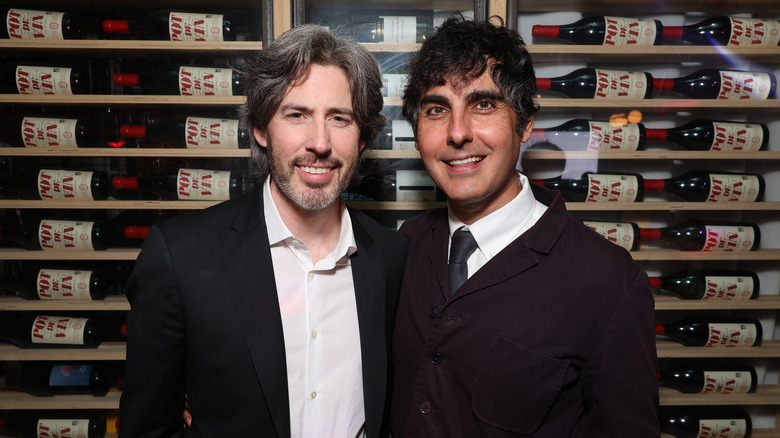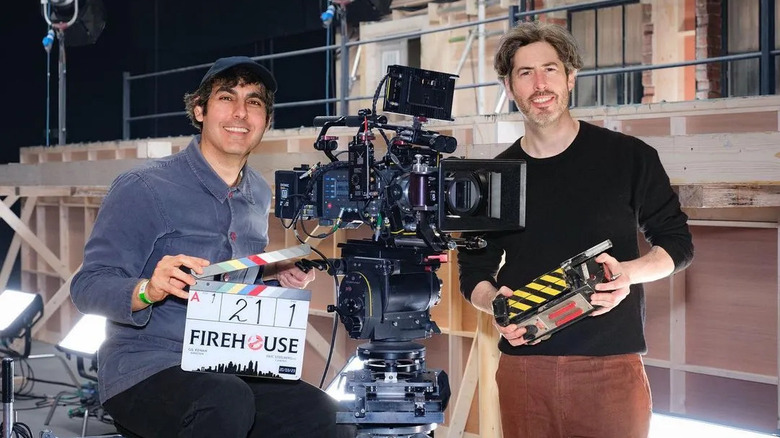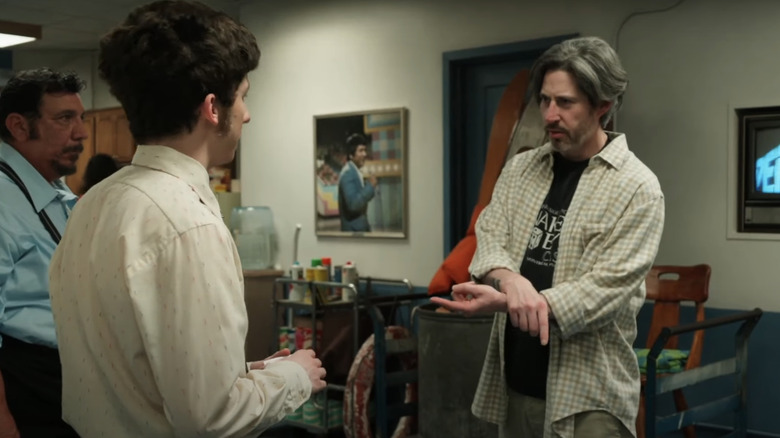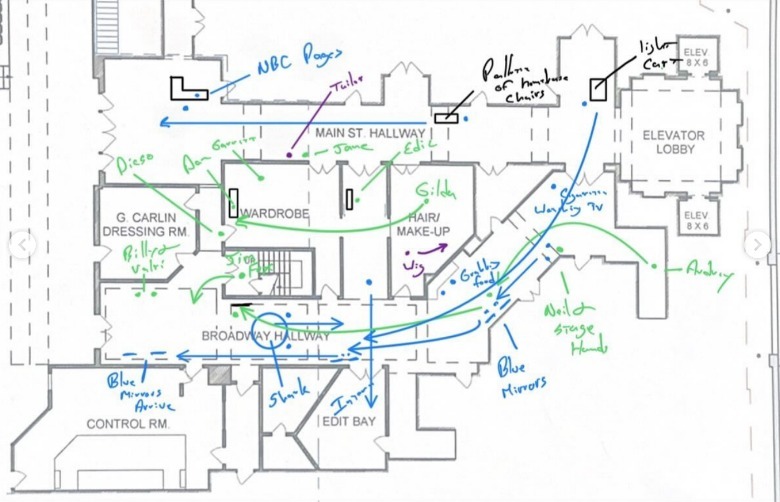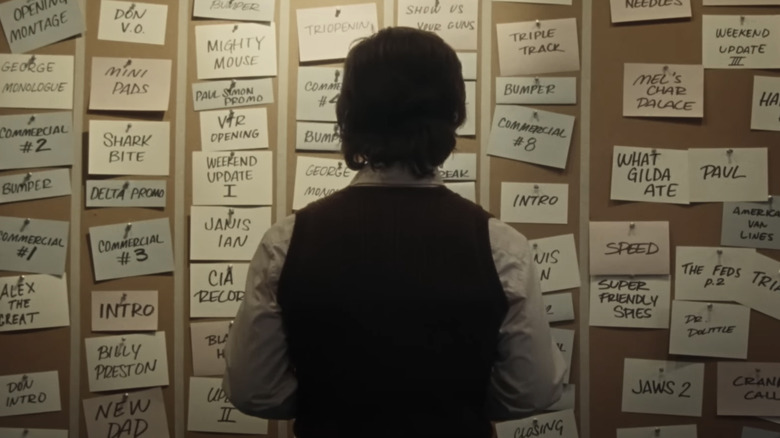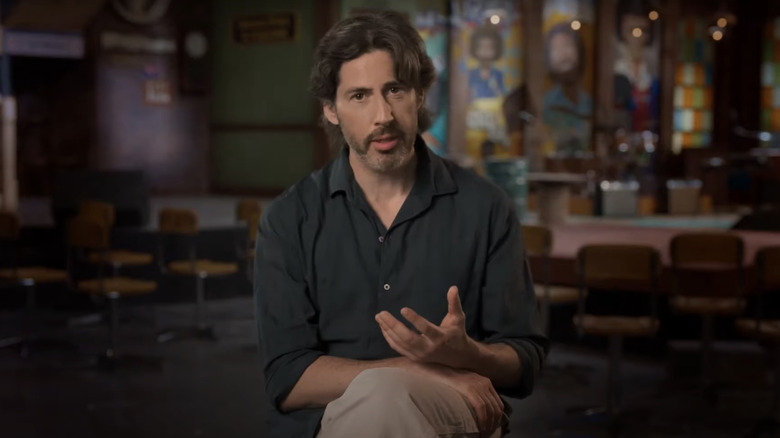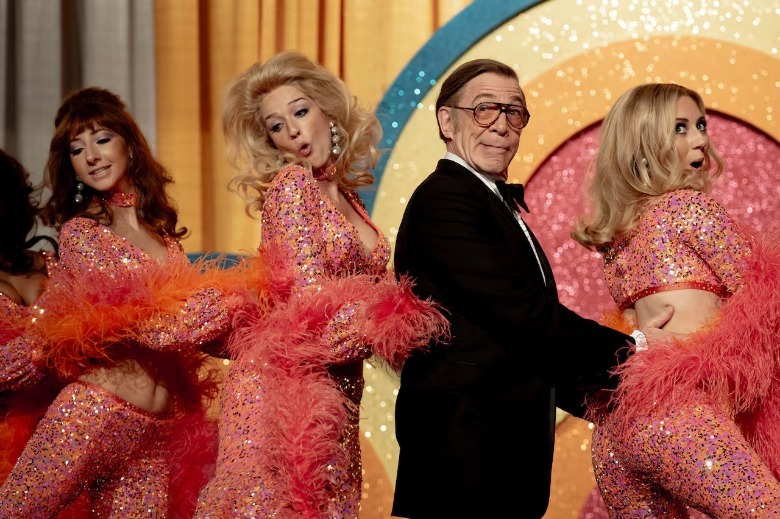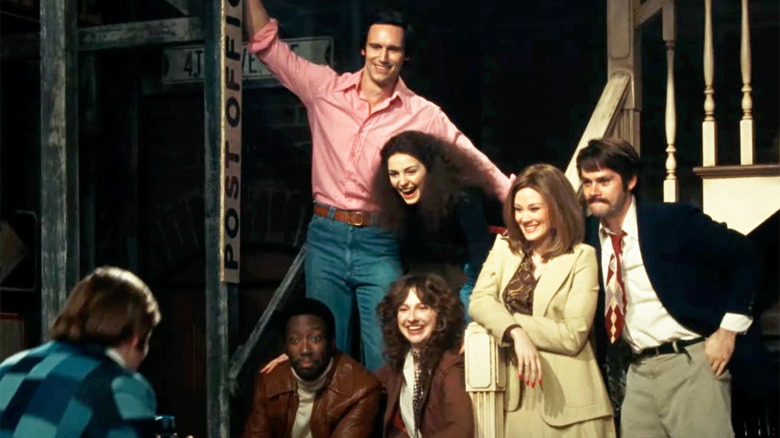Saturday Night Duo Jason Reitman & Gil Kenan Talk Recreating SNL History And Planning Chaos [Exclusive Interview]
"Saturday Night" is playing in theaters everywhere now, showcasing the chaotic chronicle of the 90 minutes preceding the first episode of the late night sketch comedy series "Saturday Night Live" (or at least the show that would eventually have that title). Jason Reitman ("Up in the Air," "Juno") directed the film, and he also co-wrote the script with producer Gil Kenan (director of "Ghostbusters: Frozen Empire"), both bringing a long-time love for "SNL" with them. In fact, Reitman was able to live the rare dream of writing at "SNL" for a week. Meanwhile, Kenan's love for "SNL" began in the '90s with the likes of "SNL" legends like Mike Myers, Dana Carvey, and Chris Farley, but it carries through to this day.
Being a die-hard "SNL" fan myself, I was thrilled to speak with both Reitman and Kenan about piecing together the early history of "Saturday Night Live" into this electric film. It's funny, it's frenetic, and it very much captures the spirit of "SNL," even if it's not always accurate in depicting certain events or characters. Below you'll find both of my interviews with Jason Reitman and Gil Kenan, digging into the finer details about making "Saturday Night" and their love of "SNL."
Note: These interviews have been edited for clarity and brevity.
How Jason Reitman and Gil Kenan came together and shared a love of SNL
Gil Kenan: We met as exactly as you would expect us to have met, which is lacing up ice skates in a locker room waiting for a scrimmage match of an ice hockey game. And that was when both of us were making our very first film. So I was making "Monster House" and Jason was making "Thank You For Smoking," and we really just struck up a conversation that has sort of kept going now for 20 years, and that stayed as sort of a casual friendship that then developed into storytelling really organically. We just started going on road trips, and then we started to talk specific stories, screenplays. We collaborated on an animated screenplay that was sort of just us kind of getting our gears turning. And SNL was a story that we started talking about a really long time ago.
I should say both of us were raised on "Saturday Night Live." I am pretty sure I learned how to program my parents' VCR in order to be able to record "Saturday Night Live" because I couldn't stay up late enough, but I would watch it as a Sunday morning ritual with my brother. That sort of tradition has kept going since I was a little kid. So this really informed a big part of my comic language and storytelling language. But we started talking about this on our road trips. For Jason, the experience was a little bit more sharpened because after "Juno," he had the experience of going for a week to sort of shadow and write on the show. I think that, for him, really crystallized the same level of excitement that I had, but he had a front row seat to it.
Jason Reitman: I got to be a guest writer on "SNL" back in 2008, and a lot of it came out of my experience there. But even when I was younger, there always used to be this moment where they would do these bumpers, where in between sketches there would be just two or three seconds where they would show you behind the scenes, the camera's moving, you'd hear the person in the control room going, "Three, two, get them to makeup, one, get that thing there." And I would go, "I want more of that. Can you show me more of that?" I think I've always been kind of enthralled by behind the scenes. It's why I love Michael Ritchie movies. I love "The Candidate" and I love "Smile," and I love to see how things are made, and I can watch "how things are made" TikToks for hours. I think it's the reason I had to remove TikTok from my phone. But getting to be at "Saturday Night," at the table read, writing a sketch, [being] on the floor as they went live, I wanted audiences to be able to feel that.
Kenan: So we started to talk about what it was like to put that show on, and started to imagine what it must have been like that first night when nobody really knew what the show was going to be. No one knew whether it would be a success, whether it would find an audience, but [they were] this group of legends and they sort of worked out to becoming sort of cultural forces of their own, each of the folks involved with that first episode, [and] it just started to take on a life of its own. We obviously wrote a couple of "Ghostbusters" films together and the first one, "Ghostbusters: Afterlife," was really our first produced screenplay together. It was in the wake of that, before that film came out, but after it had been shot, that we started to talk very seriously about making this story a screenplay that we would sink our teeth into. Then the pandemic hit, and we found ourselves with a sort of perfect captive audience, which was every single person who we could get our hands on who worked on that first episode. We just started this, for me, absolutely eye-opening, incredible, joyful series of conversations.
Figuring out the narrative of Saturday Night
Kenan: One of the cool things about starting this project off is that we didn't really have any preconceived notions of what the narrative was going to be. We knew it was going to end with "Live from New York, it's Saturday night" — spoiler alert — but that, for us, was actually the basic premise of the shape of the thing. But within the runtime of our story, we kept ourselves really open and neutral to seeing how the relationships and stories that we were told were going to shape the narrative. What that meant was that we came at it with a clean slate.
Below is a map used for planning character and camera movement that Jason Reitman posted to Instagram.
As we started to build up our understanding of what was going on that night, where everyone was, we actually did sort of create mental maps of where people were at various points in the building. This was a really complicated screenplay to assemble because we not only had to track 80-something speaking characters, but we also have to track things like the sofa that catches on fire, and then another sofa that is retrieved from the writer's floor and brought down to [Studio] 8H and then ends up on screen. These things began to create almost like a mesh, and that mesh of moving characters, of barnyard animals that are inexplicably in the corridors and specific props, furniture, sketch concepts that are being exercised, all of these began to come up like you would raise a barn. One day we looked at what we had and realized that enough skeleton, enough superstructure, was [there] for us to start really honing down and then sinking our teeth into.
Planning the chaos of Saturday Night Live
Kenan: It's a good thing that this is Jason's 10th movie, not his second, or God forbid first, because his experience and confidence really showed in being able to bite off these really complex long sequences. Also, our [First Assistant Director Michele] Shelley [Ziegler] is a genius and was able to create a framework that allowed so many characters to be on stage at any one time. The blessing also comes with the entire ethos of this production. It's one of the things that both made this possible, and I think one of the things that makes the movie feel so alive to an audience is that there's no artifice here.
We just built 8H, it's a full sound stage. It's a multi-story set that allowed the camera and the performers and now the audience to move through this place without having to worry about where the edges of the frame are. What it does is innumerable in creating an environment of storytelling, both for us as filmmakers and for the audience experiencing it, with something just feels like it's real, and you can't help but feel like you're getting pulled into that world. It was an absolutely incredible stage to be on, and I've never been on a film set that's felt so close to the subject of the story that is being told on the set: the energy, the way the thing was filmed, the looseness of it, the sort of camaraderie of it. Not a giant crew, but an expert one. Everyone really worked together to capture that spirit.
Finding and creating the little moments of Saturday Night
In "Saturday Night," there are several amusing runners that recur throughout the movie. One of them finds writer Tom Schiller walking around the set of Studio 8H with incense. Another has Lorne Michaels' executive assistant (and cousin) Neil Levy, played by Andrew Barth Feldman, occasionally entering a scene and providing the countdown as to how much time is left until the show airs.
Kenan: One of my favorite things about Lorne [Michaels] and Tom [Schiller] and his new age practices is that Lorne has no judgment. He spent time on the West Coast. He accepts it. In fact, he embraces it when the moment is right. Yeah, those are two examples, the Tom incense runner and the Neil Levy countdown runner are both two concepts that we just had no idea about before we interviewed both of those folks. The Neil Levy thing, we just thought we were being completists when we talked to Neil, who was Lorne's cousin. We really felt like we were just kind of completing our mental map of who was there that night. In talking to Neil, a character just started to materialize. By the end of that interview, we realized we had something we could really use to create a sense of momentum, comic momentum for our story.
Tom's an amazing character. I actually just revisited our interview with him. This is actually the thing about that made writing it both so thrilling and complicated. We had to make really hard choices about who to focus our energy with. Tom Schiller deserves a whole movie about him as a character. He had an incredible run on the show. He ended up sort of taking over the film segments, became the guy who created these iconic "SNL" short film concepts after the Albert Brooks era ended, ended up having a feature career. He is a real personality. Anyway, so this was one of the things is we ended up having a bounty of stories, and our job and both relying on our own experiences as filmmakers and also just starting to focus this in on Lorne was about creating a coherent and propulsive shape to it.
In addition, there's a key moment for Lorne Michaels (Gabriel LaBelle) as a character where he has an unnerving realization about his potential future if he doesn't get "SNL" on the air.
As we speed towards the third act of "Saturday Night" and the clock is ticking towards the live premiere of "SNL," Lorne Michaels is left without a lightning technician. But he hears there might be a good replacement on one of the other floors of 30 Rockefeller Plaza, specifically where "The Rumpus Hour" variety show is being shot with Milton Berle (J.K. Simmons) and some dancing girls. When Michaels heads up to "The Rumpus Hour" set to recruit this lighting technician, Berle is dancing with his girls, so he's waiting in the wings for the take to be finished so he can steal his new crew member. As he looks upon the remnants of old television, the tired formula of aging TV personalities delivering the same old thing, his gaze shifts to the show's director, who is sitting miserably in a production chair with a cigarette in hand, staring off into the distance, not even paying attention to the show's taping. It's a moment where Michaels needed a boost to keep going in the face of increasingly insurmountable odds, and he rushes to snag his new lighting technician and get "Saturday Night" live on the air.
Reitman: That moment happened the day of, I was just figuring that shot out, because it's a long shot. It takes them all the way from the elevator through the whole "Rumpus Hour," up the stairs, and I felt like something was missing. And I thought, Oh, you know what'd be really interesting? If Lorne saw this alternate future where he saw like, "Who would he be if he didn't stand up for himself? Who would he be if he didn't follow his convictions?" And then the funny thing is I have to go through all the background actors and be like, "Who looks like failure?" [laughs]
Towards the end of the movie, one of the pivotal, uplifting sequences finds the entire cast and crew coming together to help complete the real brick floor that was used for the main stage. It's a moment of unity among a group of people who have mostly been at each others' throats throughout the evening.
Reitman: When I heard the fact that they actually laid bricks for home base — which is insane. No one would ever do that, particularly in New York, when you're shooting on the eighth floor of an office building, why are you laying bricks? But they had an obsession with real detail. It showed the fact that none of them had ever made TV before. That the production designer came from Broadway. It was like, "Yeah, we're going to lay real bricks," and it seemed like an opportunity for these two generations to finally coalesce at the last second.
Could we get a Saturday Night sequel?
While "Saturday Night" tells a complete story, there's a 50-year history of "SNL" that is ripe with behind-the-scenes drama. I asked both Reitman and Kenan if they'd be interested in digging back into "SNL" history for a sequel, and they were quite enthusiastic, should the right story opportunity present itself.
Reitman: Oh my God. I would make 20 sequels. I've never had this on set. Usually on set, people are like, "Hey, I'm having a good time, but when this wraps, I'm ready to leave and go do something else." And every day, the crew [was] pitching me, "Could we do 1976? Could we do Ebersol in 1980? Can we do Eddie Murphy shows up? What about Will Ferrell's first day?" Everyone is pitching their version of — or things that happened with the music or the band. My answer is "Yes." If the right idea happened, this group loved making this movie, and I would go do it again tomorrow.
Kenan: Yeah, absolutely. Look, there is high drama in "SNL." It's actually stayed high stakes for nearly every season. We did entertain the idea before the sets were torn down, because they were so cool and so one-to-one what exists in New York. The grim reality of filmmaking is you always have to tear it down and build it back up again. But the answer is yes, it is a ripe premise or world for their storytelling. But I'm sure Jason also told you that this movie finished shooting weeks ago, so the dust, the paint is still wet on this movie.
It was a pretty special shoot and it was quick, but when you build the right production, when you have the right cast, and when everyone feels committed to the task at hand, you don't want to leave. And that feeling was very much present on set. The only solace we had is that we knew we were about to go put this movie together, and that we'd get to keep living with that thing forever. But yeah, it was a special one.
I also asked Kenan if there was an era of "SNL" that felt like it belonged to him.
Kenan: This is an age-dependent matrix, I think. But I'm definitely the Chris Farley years. So basically, Dana Carvey, Mike Myers, Chris Farley, and then extending out. I still watch every week. So I feel like that was just, for me, the beginning of the flood. The waters have not receded.
"Saturday Night" is playing in theaters everywhere now.
